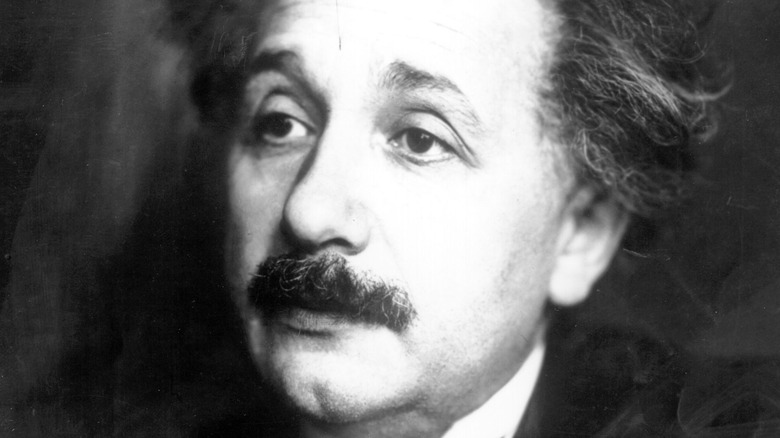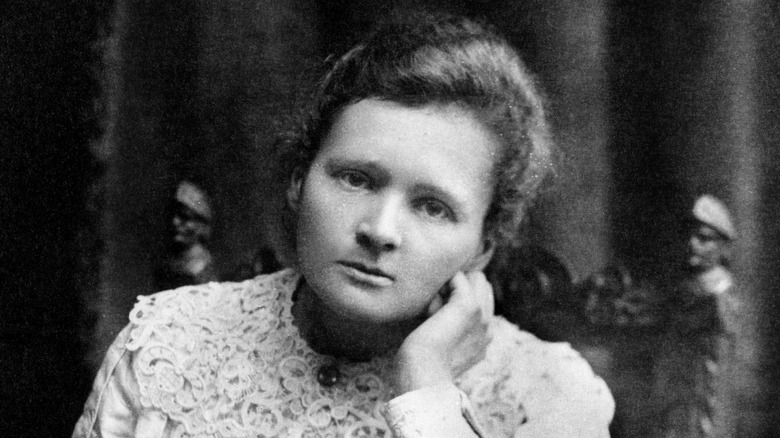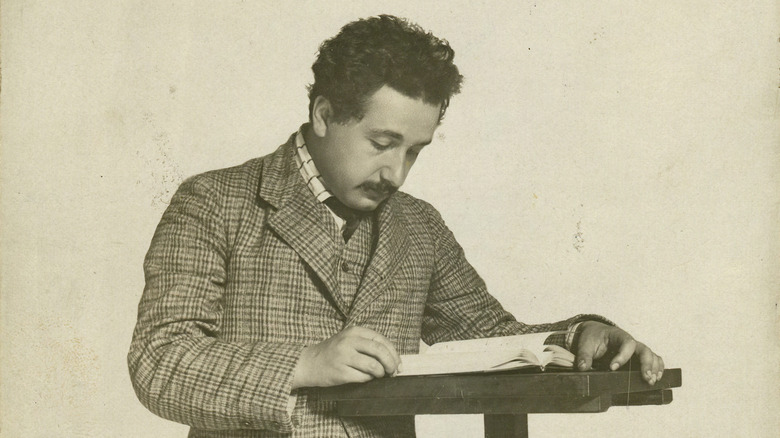Albert Einstein's Letter To Marie Curie Was Full Of Great Advice
The British theoretical physicist Stephen Hawking, who died in 2018, was celebrated throughout his life for his contributions to science, his introduction of physics to mass audiences through his 1988 book "A Brief History of Time," and his incredible reserves of resilience in conducting his work while living with the motor neuron disease amyotrophic lateral sclerosis (ALS). That condition eventually meant that he became a wheelchair user who famously spoke through a machine created to his own specifications.
However, even the greatest minds are subject to the scrutiny of the paparazzi during their own lifetimes. In his final years, while Hawking remained the world's most respected and recognizable scientist, his private life increasingly became fodder for the press. In 2007, periodicals such as Vanity Fair sought to investigate shocking claims that the renowned scientist was being physically abused by his second wife, Elaine Mason. Hawking himself was denying the claims, despite what those close to him concluded was evidence of abuse.
But it's not just in the modern age that scientists have found their private lives the subject of the press. At the beginning of the 20th century, the Nobel Prize-winning physicist and chemist Marie Curie found her reputation damaged by what journalists considered lurid details about her personal life. But Curie enjoyed the support of one prominent defender among her fellow scientists; that of her friend, Albert Einstein.
If you or someone you know is dealing with domestic abuse, you can call the National Domestic Violence Hotline at 1−800−799−7233. You can also find more information, resources, and support at their website.
Marie Curie's tragic romance
Marie Curie and her husband Pierre became world-famous in 1903, when they were jointly awarded the Nobel Prize in Physics for their pioneering research into radioactivity. However, their life together was soon to take a tragic turn. In 1906 Pierre was killed in a freak accident in Paris when, after losing balance while crossing the street, he fell beneath the wheels of a horse wagon and suffered a fatal skull fracture (via Biography).
Marie mourned the loss of her husband deeply, but nevertheless honored his legacy by continuing his work and teaching, according to Biography. Pierre's loss was also felt by the physicist's former doctoral student and protege, Paul Langevin. After Pierre's death, Marie and the younger scientist grew closer, and began a romantic affair despite Langevin being married — albeit unhappily — to another woman.
But the affair threatened to destroy Marie Curie's career when, shortly after the affair came to the attention of Langevin's wife, love letters between the two scientists began to appear in the Parisian tabloid newspapers. (The American Institute of Physics suggests the letters might have been forgeries.) According to the Einstein biographer Walter Isaacson ("Einstein: His Life and Universe," posted at the Internet Archive), Langevin's wife had hired someone to break into the apartment where Curie and Langevin were having their affair to steal their correspondence and leak it to the press. As a large-scale science conference was underway in Paris at the time, with both Curie and Langevin in attendance, the illicit affair garnered lots of attention, with Curie vilified as the destroyer of the Langevins' marriage.
Einstein's advice to Curie
Albert Einstein is, of course, famous as the father of relativity, but in the age of the internet he is also revered for his way with words, and for his dazzling wit which has seen him become a popular source of meme-ified quotes, inspirational or otherwise. So it perhaps comes as no surprise that when his colleague Marie Curie found herself on the verge of what we might today describe as being canceled, Einstein — who revered Curie for her intelligence as well as her honesty and lack of pretension, according to Walter Isaacson's "Einstein: His Life and Universe" — was eager to take up his pen and offer Curie some powerful words of support.
Einstein's letter begins with him assuring Curie of his admiration for both her and Langevin, and he informs her that he considers his friendship with both of them to be a personal privilege. Then, in a typically verbose flourish, he advises her: "If the rabble continues to occupy itself with you, then simply don't read that hogwash, but rather leave it to the reptile for whom it has been fabricated."
Not long after the scandal erupted, Curie was honored with a second Nobel Prize, this time in chemistry. She was the first person to have received two such awards (per The Nobel Prize).


